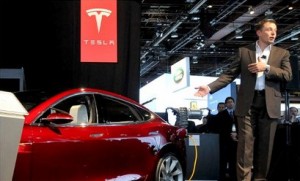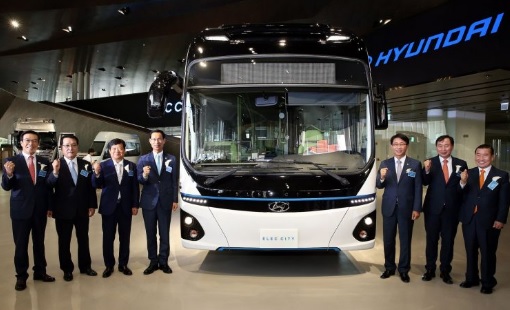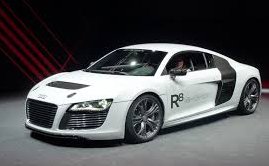 In the wake of New Jersey’s decision on Tesla Motors’ right to run corporate retail stores, there are two more states seeing developments. Ohio Gov. John Kasich has received a letter from General Motors expressing concern that the state would allow Tesla to expand beyond the two Ohio stores it currently has in operation. GM thinks the state should oppose legislation allowing Tesla to open more stores, as it would allow Tesla to compete under a different set of rule. “We understand discussions are ongoing over legislation which could provide a broad exemption for a single manufacturer, Tesla Motors Inc., to circumvent long-established legal precedent on how new motor vehicles are marketed, sold and serviced in your state,” Selim Bingol, GM’s senior vice president of global communications and public policy, wrote in the letter.
In the wake of New Jersey’s decision on Tesla Motors’ right to run corporate retail stores, there are two more states seeing developments. Ohio Gov. John Kasich has received a letter from General Motors expressing concern that the state would allow Tesla to expand beyond the two Ohio stores it currently has in operation. GM thinks the state should oppose legislation allowing Tesla to open more stores, as it would allow Tesla to compete under a different set of rule. “We understand discussions are ongoing over legislation which could provide a broad exemption for a single manufacturer, Tesla Motors Inc., to circumvent long-established legal precedent on how new motor vehicles are marketed, sold and serviced in your state,” Selim Bingol, GM’s senior vice president of global communications and public policy, wrote in the letter.
Arizona may allow Tesla to sell directly to consumers at retail stores within the state – if the company is willing to have a service center in the state to handle repairs and warranty issues. The state’s Senate Commerce, Energy and Military Committee voted three-to-two to push forward this bill in the legislature. Arizona Senate Majority Leader John McComish called the bill a “pre-emptive strike” against future laws that outlaw Tesla’s direct-sale model. The bill will need to go before another committee for review, then would go to the full Senate.
And in other clean transportation news…….
- Toyota has a very interesting offer through its Toyota Financial Services (TFS) captive finance arm – the auto industry’s first-ever Asset-Backed Green Bond; the company is outlaying $1.75 billion, which was upsized from $1.25 as institutional investors have expressed interest in this clean transportation investment opportunity. TFS will use the proceeds from Green Bond toward the purchase of retail finance contracts and lease contracts for Toyota and Lexus vehicles that meet high green standards as established by three criteria: gasoline-electric hybrid or alternative fuel powertrain; minimum EPA estimated MPG (or MPG equivalent for alternative fuel vehicles) of 35 city / 35 highway; and California Low-Emission Vehicle II (LEV II) certification of super ultra-low emission vehicles (SULEVs) or higher, which would include partial zero emissions vehicles (PZEVs) and zero emissions vehicles (ZEVs). Qualifying models from Toyota include: Prius, Prius C, Prius V, Prius Plug-in, Camry Hybrid, Avalon Hybrid, and RAV4 EV. From Lexus, qualifying vehicles are CT 200h and ES 300h.
- Producing more than 5,000 compressed natural gas (CNG) fueling tanks last year is one of several positive signs that Quantum Fuel Systems is on a turnaround that should continue, according to stock market analyst website Seeking Alpha; that’s more than double the amount of tanks that were produced in 2012. The company was close to collapsing 12 to 18 months ago, but a corporate restructuring has been completed and seems to have a brighter future. Quarterly earnings were reported earlier this month – positive earnings were reported for the first time in quite a while. The company’s share price has increased by more than 250% in the past 12 months. About 10,000 tanks are expected to be delivered in 2014.
- The Energy Independence Summit will be taking place in Washington, DC, March 30-April 2. Leaders in clean transportation will be gathering to share best practices and educate federal policy makers about the benefits of the US Dept. of Energy’s Clean Cities program. The need for additional tools and resources to overcome barriers to the widespread use of clean vehicles and fuels will also be discussed. You can contact Ken Brown at Transportation Energy Partners at ken@akbstrategies.com or (202) 674-7777 if you have questions or would like additional information about the Summit.
- The CHAdeMO electric vehicle fast charging protocol, which was initially adopted in Japan by domestic automakers, has been officially recognized as an international DC charging standard by electrical standards organization the International Electrotechnical Commission. The final draft international standards were approved by committees in January 2014, and were finally published last week on the IEC website. The number of CHAdeMO fast charging stations doubled in 2012 to more than 2,000 units are expected to grow, the association said last year.
- Dish Network unveiled 47 new propane-powered vehicles at an event on Friday in Hawthorne, Calif. Roush CleanTech converted Ford E-Series vans for Dish Network, and the company’s goal is to deploy 200 of these alternative-fuel vehicles that will run on propane autogas.
- Volvo Trucks is bringing its full range of alt-fuel vehicles to the 2014 Mid-America Trucking Show in Louisville, Ky. That lineup will include: Volvo VNL 300 CNG with 400-horsepower 11.9-liter Cummins Westport ISX12 G engine; Volvo VNL 300 LNG with 455-horsepower Volvo D13-LNG (compression ignition) engine; and Volvo VNL 300 dimethyl ether (DME) with 435-horsepower Volvo D13-DME engine.
- BMW plants to produce more than 100,000 electric vehicles per year to meet tougher European emission standards that reach a key mandate level by 2020. CEO Norbert Reithofer told reporters that BMW will increase production levels of its i3 and i8 in 2018 in anticipation of getting up to 100,000 units annually in order to meet the stricter carbon dioxide emission standards. BMW was pleased to see that its i3 took 10,000 internet orders when it went online last fall.
 Republic Services tripling RNG: Waste disposal company Republic Services will be increasing its usage of renewable natural gas (RNG) by three times what it used in 2016 in its CNG-powered refuse trucks through an expanded agreement with Clean Energy. Clean Energy’s Redeem brand of RNG fuel will be deployed across Republic’s CNG-fleet in 20 states. Republic will be able to reduce its fleet emissions by approximately 110,000 metric tons of CO2e (carbon dioxide equivalent) over a three-year period, which is equal to planting 2.8 million trees or removing 23,200 cars from the road. Using RNG and alternative fuel trucks will combine with intelligent routing and the company’s One Fleet maintenance initiative will help the company hits its greenhouse gas emissions reduction targets.
Republic Services tripling RNG: Waste disposal company Republic Services will be increasing its usage of renewable natural gas (RNG) by three times what it used in 2016 in its CNG-powered refuse trucks through an expanded agreement with Clean Energy. Clean Energy’s Redeem brand of RNG fuel will be deployed across Republic’s CNG-fleet in 20 states. Republic will be able to reduce its fleet emissions by approximately 110,000 metric tons of CO2e (carbon dioxide equivalent) over a three-year period, which is equal to planting 2.8 million trees or removing 23,200 cars from the road. Using RNG and alternative fuel trucks will combine with intelligent routing and the company’s One Fleet maintenance initiative will help the company hits its greenhouse gas emissions reduction targets. Hyundai electric bus: Hyundai just revealed the Elec City electric bus during an event in Korea. It has a 256 kWh lithium-ion polymer battery and a 240 kW electric motor, delivering a driving range of 180 miles. Fast charging capability will enable a full recharging in just over an hour. Production and sales begin in 2018. No word yet on whether it will stay in Korea or go overseas to compete with electric bus makers BYD and Proterra.
Hyundai electric bus: Hyundai just revealed the Elec City electric bus during an event in Korea. It has a 256 kWh lithium-ion polymer battery and a 240 kW electric motor, delivering a driving range of 180 miles. Fast charging capability will enable a full recharging in just over an hour. Production and sales begin in 2018. No word yet on whether it will stay in Korea or go overseas to compete with electric bus makers BYD and Proterra.

